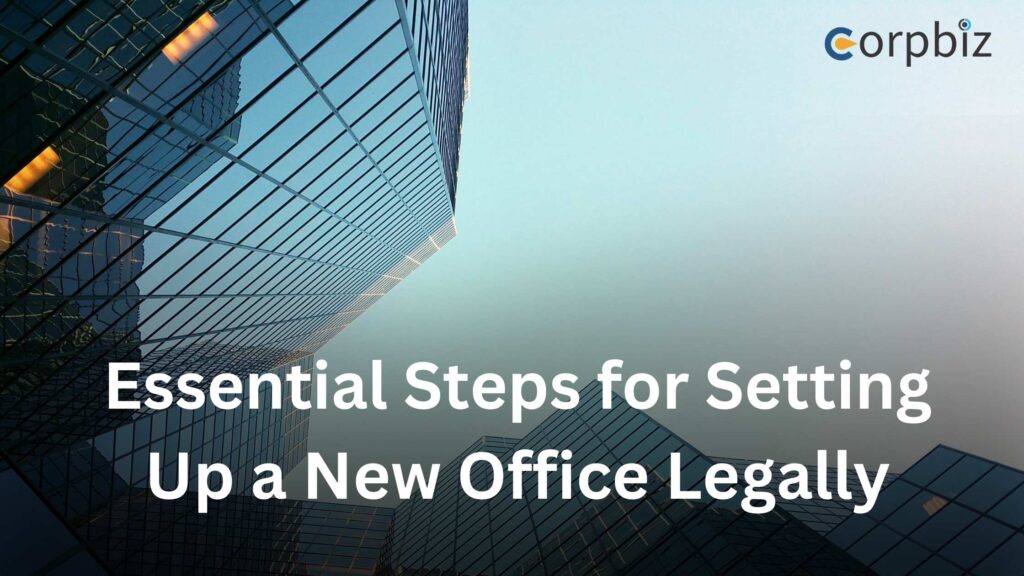Setting up a new office is an exciting milestone for any business, often marking growth, stability, and new opportunities. But before you start arranging desks and setting up equipment, it’s important to ensure your office space is legally compliant. This involves completing required registrations, following local regulations, and preparing to operate without legal issues.
In this guide, we’ll walk through the essential steps for setting up a new office legally, including information on branch office registration, FEMA compliance, and other related services.
1. Choose the Right Location
The first step in setting up your office is choosing a location that aligns with your business goals and meets legal standards. When expanding, you may also need to consider if your business structure supports additional offices, such as a branch office or liaison office.
- Check Zoning Laws: Local zoning laws regulate how land and buildings can be used. Make sure your chosen location is zoned for commercial use and that your business type is permitted.
- Consider Accessibility: Ensure the office is accessible for employees, customers, and people with disabilities, as per accessibility laws in many regions.
2. Register Your Business with the Appropriate Authorities
To operate legally, you must register your business with government authorities. This is particularly important if you’re setting up a branch office or liaison office that operates under the main company.
- Branch Office Registration Services: If expanding your operations with a branch office, you’ll need to register it with local authorities. This process often requires additional documentation about the parent company.
- Liaison Office Registration Services: A liaison office, also known as a representative office, allows businesses to maintain a presence in another location without directly engaging in commercial activities. Many companies use liaison offices to explore markets or promote business partnerships.
3. Comply with FEMA Regulations
If your office is part of an international business, compliance with the Foreign Exchange Management Act (FEMA) is crucial. FEMA regulates foreign exchange in India and oversees offices, like project or branch offices, that involve foreign investment or operations.
- FEMA Compliance Advisor: Consulting with a FEMA compliance advisor ensures that your branch, project, or liaison office meets all necessary requirements. They can help you understand foreign exchange regulations and guide you on obtaining approvals, especially for repatriating profits or managing funds.
4. Obtain a Tax Identification Number (TIN)
A Tax Identification Number (TIN) or similar tax registration is crucial for filing taxes and reporting income. This helps the government track your business’s financial activities and ensure tax compliance.
- Application Process: Apply for a TIN from your country’s tax authority. The application usually requires basic details about your business, including name, address, and type of ownership.
- Additional Tax Registrations: Some businesses may need GST registration, VAT, or other tax identifiers depending on the nature of their operations.
5. Secure Necessary Permits and Certifications
Certain industries require specific permits or certifications to operate legally, especially when setting up branch offices or project offices that may handle specialized tasks.
- Project Office Registration Services: If your company plans to carry out specific projects in a new location, you may need a project office. Project offices are ideal for companies with temporary operations and specific tasks within a region. Registering a project office involves obtaining permits and complying with local rules related to project-specific operations.
- Health and Safety Permits: Ensure your office complies with health and safety regulations, especially if your business handles food, chemicals, or machinery.
- Fire Safety Permits: Offices must meet fire safety standards, which may include having smoke detectors, fire alarms, and emergency exits.
6. Create a Lease Agreement or Purchase Contract
If you’re renting or buying an office space, having a solid lease agreement or purchase contract is essential.
- Lease Agreement: For rental properties, ensure the lease agreement includes details on rent, lease term, allowed renovations, and responsibility for maintenance.
- Purchase Contract: If buying, work with a legal professional to draft a contract covering the sale terms, price, payment structure, and property details.
For branch offices or project offices, additional clauses in the lease or purchase agreement may be necessary to clarify the temporary or auxiliary nature of the space.
7. Adhere to Labor and Employment Laws
If you have employees, your office must comply with labor laws to ensure a safe and fair work environment. This includes:
- Workplace Safety Standards: Maintain a safe workspace with proper lighting, ventilation, and ergonomic furniture. The Occupational Safety and Health Administration (OSHA) provides specific guidelines.
- Anti-Discrimination and Equality Laws: Follow hiring practices aligned with equality laws that protect against discrimination based on race, gender, religion, disability, and other factors.
8. Set Up Data Privacy and Security Measures
Protecting data and privacy is essential for modern businesses, and many countries have laws around data protection.
- Data Privacy Policies: If your business collects personal data, establish a privacy policy that informs customers about data collection and protection.
- Cybersecurity Protocols: Set up cybersecurity measures to protect sensitive information, including firewalls, encryption, and secure access controls.
9. Prepare an Emergency Plan
Safety should always be a priority in any office. Creating an emergency plan can help you prepare for unexpected situations.
- Fire and Evacuation Plan: Outline a clear evacuation route and procedures in case of a fire.
- First Aid Kit: Keep a first aid kit in the office and train employees on how to use it.
10. Install Proper Signage
Having clear signage in your office is often a legal requirement. This can include:
- Business Signage: Display your business’s name and address outside the office.
- Emergency and Safety Signs: Display emergency exit signs, fire extinguisher locations, and safety information visibly.
11. Keep Financial Records and Accounts
Accurate financial records are essential for compliance and efficient business management.
- Accounting Software: Use accounting software to track income, expenses, payroll, and taxes.
- Bank Statements and Invoices: Keep all financial documents organized, as they’re essential for tax filing and audits.
12. Register for Workplace Insurance
Insurance protects your office and employees. Several types of insurance may be required by law:
- Workers’ Compensation Insurance: Covers medical expenses and lost wages if an employee gets injured at work.
- Liability Insurance: Protects your business if someone is injured on your property or if there’s property damage.
13. Review Local Advertising and Signage Regulations
If your business involves signage, advertising boards, or banners outside your office, it’s essential to know local advertising regulations. Some cities have strict rules about the size, placement, and type of signs you can use.
14. Follow Up with Regular Compliance Checks
Laws and regulations are always evolving, so it’s essential to conduct regular compliance checks to ensure your office remains legally compliant.
- Annual or Quarterly Audits: Schedule regular audits to review your compliance status.
- Legal Updates: Stay updated on changes to local, state, and national laws affecting your business.
For branch office and project office registration services, regularly consulting a FEMA compliance advisor can help you keep up with international and foreign exchange regulations.
Final Thoughts
Setting up a new office legally requires thoughtful planning and an understanding of various legal requirements. By following these steps, you can avoid potential legal issues and create a safe and productive environment for your team and clients. For businesses expanding through branch offices, liaison offices, or project offices, compliance with local and international regulations is especially crucial, and working with advisors experienced in FEMA compliance or project office registration services can offer extra peace of mind.
Taking the time to ensure legal compliance now allows you to focus on growing your business confidently. Always seek advice from legal and financial professionals to meet all necessary requirements and regulations.



